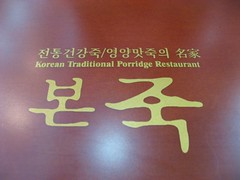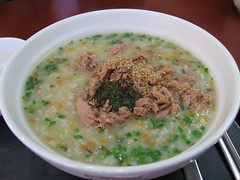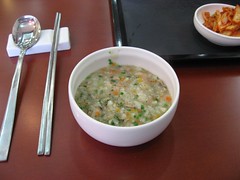 We went out for lunch yesterday to the new Outback Steakhouse which had opened in our district, but due to some miscommunication we discovered it wouldn't open until mid-afternoon. Already hungry, we didn't want to wait for a couple of hours so made our way to a nearby Korean Traditional Porridge Restaurant (so reads the only English clue on the outside). I've seen a couple of these places in Korea, but never really thought about what might be served inside; porridge carries somewhat negative connotations for me, the English word largely being associated with the pre-school and nutritionally questionable boiled oat breakfasts of my childhood.
We went out for lunch yesterday to the new Outback Steakhouse which had opened in our district, but due to some miscommunication we discovered it wouldn't open until mid-afternoon. Already hungry, we didn't want to wait for a couple of hours so made our way to a nearby Korean Traditional Porridge Restaurant (so reads the only English clue on the outside). I've seen a couple of these places in Korea, but never really thought about what might be served inside; porridge carries somewhat negative connotations for me, the English word largely being associated with the pre-school and nutritionally questionable boiled oat breakfasts of my childhood.In Korea, traditional porridge (or maybe it's just 'porridge' and the restaurant is meant to be the 'traditional' bit) is made with rice and various vegetables, and unlike the porridge back home, is served as a main meal. Fortunately what might be an otherwise limited menu is varied with additions such as tuna, prawns and other typically Korean ingredients. We ordered tuna porridge, and our watery rice arrived with said tuna neatly placed on top.


Unfortunately any kind of watery rice reminds me of the meals a former Chinese girlfriend would insist on feeding me years ago when I was sick, and while I didn't recall being thrilled with the taste when I was unwell, I wasn't convinced that it would be much improved when I was healthy - and it didn't disappoint. It wasn't bad, but I kept eating it thinking how much nicer it would be without the soup-like qualities. My wife enjoyed it more, but she actually was feeling a little ill and it transpired this was one of the reasons why we'd eventually come here; like the Chinese, Koreans believe this type of dish to have restorative qualities (or at least, it's easier to digest). Indeed, while we were there, a nurse from one of the many local hospitals came in with an order to take away, though whether it was for the staff or patients I couldn't say; you don't have to feel ill to eat this food. Indeed, the restaurant we went to was called '본죽' (Bonjuk), which is actually a chain - which perhaps I should have guessed from the smart internal appearance (individually owned restaurants can serve great food but in my experience their décor is often a whole other definition of traditional).
2 comments:
There's an Outback Steakhouse in Korea, but not in Wales? Where's the justice in that? *sigh*
A more tasty variation is if you go get shabushabu, when you're almost done they'll finish it up by using the stock to make a nice porridge.
Post a Comment